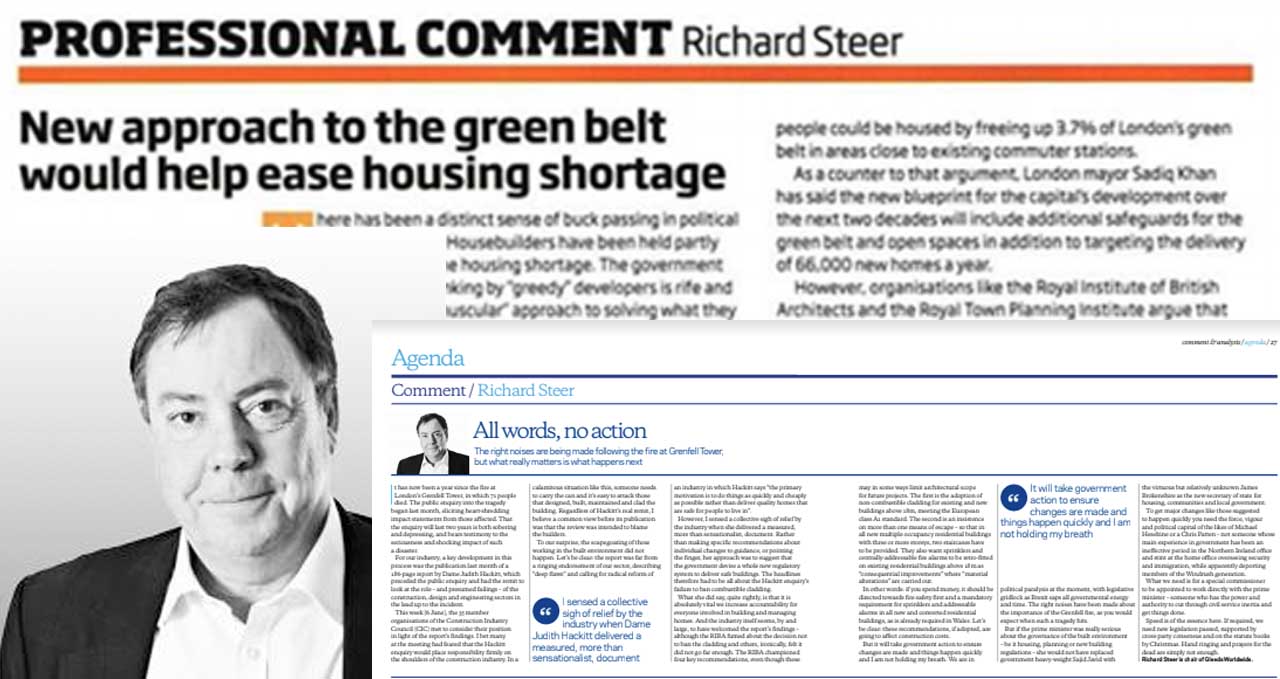The latest output figures show Brexit is hitting construction hard, as projects get packed in the face of unpredictability around costs and demand
Those working in the built environment are often compared to farmers, perceived as perpetually complaining about their lot. Cups are always half empty, and looking on the bright side is seen as a betrayal of the building code or perhaps as tempting fate.
This may be a caricature, but what is true is that we are all horrified at how the UK has declined from being the fastest-growing economy in Europe to one of the worst performers in such a short space of time. The
latest figures from both the Office for National Statistics (ONS) and the Construction Products Association (CPA) show clearly the harmful effect Brexit is having on our sector. The CPA revealed a fall of one-fifth in
construction output year-on-year for main contractors in the first three months of 2019; it fell by 17% for civil engineers and by 7% for SME operators.
The ONS meanwhile found there was zero growth in new work during thatperiod – and the worst time was March, the month the UK was due to exit the EU, when new
work contracted by 1.8%.
This change is being reflected in our own work on behalf of clients, who are looking to firms like ours for guidance in an increasingly uncertain economic landscape. This is something with which we can all cope – but the current vagaries of supplier costs, linked to fluctuations in sterling related to the state of talks with the EU, are impossible to predict. It is a considerable challenge for the whole supply chain to be able
to offer cost estimates for the next quarter, let
We are all horrified at how the UK has declined from being the fastest-growing economy in Europe to one of the worst performers in such a short space of time
alone for the next year. This is unsettling for the client, who understandably would rather build in a more stable market. None of this is helped by rising raw material costs, which figures from the CPA show
increased for 91% of civil engineering contractors, 60% of main contractors, 85% of heavy side product manufacturers and 82% of light side manufacturers.
From my experience, the effect all this is having on the ground is that everyone in the supply chain is becoming super risk-averse, to the extent that some are just not prepared to take on large new projects without Brexit caveats in their contracts – especially as our political masters have all the far-sighted wisdom and reliability of a Daily Star horoscope. Right across the economy, the hatches have been firmly battened down and decisions on everything from recruitment to capital expenditure are being parked until the government can provide clarification from on what direction Brexit is taking. If anything, it seems even more confused at present.
I am sure some observers, especially those who want a hard Brexit at any cost, will argue against this view that political confusion is putting the brakes on the economy. They will cite the latest IHS Markit/CIPS update, which showed some modest growth driven by a rise in housebuilding. According to this survey, construction output increased in April for the first time since the start of this year, despite a dip in activity in
both the commercial and civil engineering sectors. However, I would posit that we cannot all rely on the residential sector to prop up the entire built environment. Construction is a part of the economy that is worth up to 8% of GDP when it is firing on all cylinders. It is not just down to housebuilders. At a more basic level, the sense of paralysis that is spread across the industry is typified by firms that are not actively shedding large
numbers of staff, just not replacing those who
The effect all this is having on the ground is that everyone in the supply chain is becoming super risk-averse, to the extent that some are just not prepared to take on large new projects without Brexit caveats in their contracts
leave. Meanwhile, training is happening but not for large numbers, and capital projects are not cancelled but just parked. New-build may be keeping calm and carrying on, but with the Bank of England saying house
prices could decline by 30% after a no-deal Brexit, is it any wonder that most would-be homebuyers are adopting a wait-and-see attitude? The majority of housing sales remain flat.
The evidence from our view on the ground, backed up by the CPA/ONS numbers, suggests that if we want to see a change in output then the main challenge ahead will be getting confidence back into the supply chain. We have now had local elections and European elections, and still, we are all struggling to find our way through the fog of indecision. Politics governs the economy in this context, so we need a substantive change with a definitive outcome and we need it now.
Richard Steer is chairman of Gleeds Worldwide


